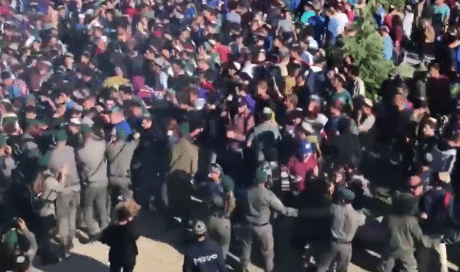Israeli police units on Tuesday began evicting Jewish settlers from 15 homes in the unauthorized outpost of Netiv Ha'avot, in the Gush Etzion region of Judea and Samaria.
After multiple efforts to cancel the eviction and repeated delays, the High Court of Justice ultimately ordered it to begin, because the homes were built on private Palestinian land.
Israeli forces are expected to demolish the structures after the eviction.
The government said it would compensate those evicted and would rebuild their homes on nearby lands that are not privately owned.
"Passive resistance only, do not raise a hand against a police officer," a demonstrator on a bullhorn called to the youths protesting at the scene.
One woman being evicted told Israel Hayom: "We are begging the boys and the police. Netiv Ha'avot does not want violence. The Netiv Ha'avot community chose to move forward and settle the land. Help us get through this day without violence."
However, despite the calls for peace and passive resistance, hundreds of settlers, mostly youths, clashed with police. Two minors were arrested, the police said in a statement.
Deputy Foreign Minister Tzipi Hotovely tweeted: "The destruction of the homes at Netiv Ha'avot is a dark stain on the Israeli justice system. No justice has been done here, only injustice. The Israeli government will build a large neighborhood to replace the homes the High Court is demolishing, but the disgrace and pain will remain."
Residents of the outpost had agreed with the state to evacuate peacefully, in exchange for which the state in February approved a new, 350-home neighborhood.
However, Israel Hayom has learned that construction on the new neighborhood has not begun because the state is essentially waiting for the High Court's ruling on a comprehensive petition for the approval of lands in Judea and Samaria for construction purposes.
The eviction process is expected to end by Friday.
Some 2,000 people attended a support rally for the residents of Netiv Ha'avot Monday night at which Justice Minister Ayelet Shaked spoke.
"Tomorrow [Tuesday] there will be a completely unnecessary eviction," Shaked said. "It is the product of a terrible mistake. It started with the erroneous answer provided by the state several years ago and its culmination is the High Court's wrong answer now. From these ruins, we will rise and build."
The High Court ordered the eviction following a petition filed by the Peace Now organization claiming that some of the homes were built on private Palestinian agricultural land.
The residents said the homes were built on land that was not recognized as private at the time.
The Civil Administration, the Israeli governing body in Judea and Samaria, later found that several of the homes had been built beyond the neighborhood's legal boundaries, some by a matter of inches.




